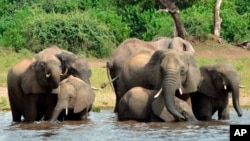Mqondisi Dube
GABORONE, BOTSWANA — Botswana has issued 400 elephant hunting licenses amid fresh opposition from conservationists. International hunters pay up to $50,000 to obtain a license in order to hunt an elephant.
In a recent notice from the Wildlife and National Parks department, the elephants are among other wildlife species that will be offered to hunters.
Botswana’s hunting season runs from April to November, attracting enthusiasts from abroad.
However, a group of local and international conservationists has petitioned Botswana’s new government, which came into power after the Oct. 30 general election, to stop the practice of trophy hunting.
Oaitse Nawa of the nonprofit Elephant Protection Society is part of those petitioning the government against hunting the big game. He said the organization is surprised the government has released the hunting quota for the new season.
“We did a petition — the idea was to ask the government to take time, to stop the elephant quota in the meantime because there was not enough consultation regarding all the stakeholders,” Nawa said. “For this quota to come out, it was a big surprise to us.”
The government held a consultative meeting at the beginning of December to decide on the number of animals to put up for the shoot.
Nawa said the group wants the new government to intervene and stop the hunts.
“It is a very big concern looking at the fact that hunting does not benefit the community,” he said. “Anything that has to do with hunting has to be reviewed. Remember, we are still dealing with the old regime and we are not surprised to see them come up with these numbers.”
The government said nearly $3 million was raised by communities in the previous hunting season, mainly from the sale of elephant licenses.
Conservationists opposed to the hunts argue the targeting of male elephants disturbs the animals’ breeding patterns.
The chief executive of the Botswana Wildlife Producers Association, Isaac Theophilus, backs hunting.
“The petition to government is unfortunate and misguided,” he said. “Trophy hunting does not target prime breeding bulls. It is highly selective. It targets animals that are past their breeding prime. So it [hunting] will nowhere affect the breeding patterns.”
Wildlife management expert biologist Dr. Erik Verreynne said hunting will not disturb elephant populations in Botswana.
“It is possible that hunting activity in an area can affect the movements of a breeding herd,” he said, “but if we see it within the larger context of 400 bulls being hunted in a population of 130,000 to 140,000 elephants in Botswana, then it’s highly unlikely that we are going to see an impact on the breeding rate or population growth of elephants.”
Botswana has the world’s largest elephant herd at more than 130,000.
The country resumed trophy hunting activities in 2019 following a five-year moratorium.
Botswana also has one of the world’s highest incidences of human-wildlife conflict, with the animals moving closer to human settlements in search of water and forage.





Forum